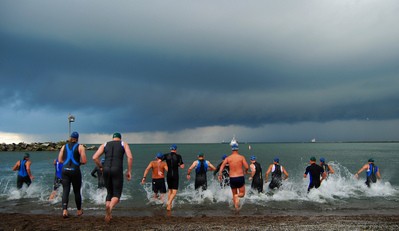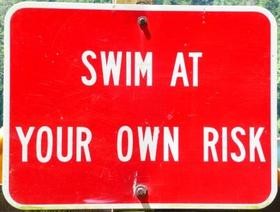 A new study that was released just days ago resulted in a sober warning directed at triathletes: "Triathlons pose at least twice the risk of sudden death as marathons do."
A new study that was released just days ago resulted in a sober warning directed at triathletes: "Triathlons pose at least twice the risk of sudden death as marathons do."
Dr. Kevin Harris, a cardiologist at the Minneapolis Heart Institute at Abbott Northwestern Hospital, led the study and presented results Saturday at an American College of Cardiology conference in Florida. The Minneapolis institute’s foundation sponsored the work and tracks athlete-related sudden deaths in a national registry.
Statistics show that for every million participants in a 26.2-mile marathon, there will be 4 to 8 deaths.
The study shows that the rate for triathletes is far higher –15 out of a million. Almost all occurred during the swim portion of the triathlon.
For the study, researchers used records on 922,810 triathletes competing in 2,846 USA Triathlon-sanctioned events between January 2006 and September 2008.
Four additional triathlon-related deaths from 2006 through 2008 occurred in events that were not officially sanctioned USAT events.
I have a mixed opinion about the results of the study and the conclusions drawn.
Study Reveals Risks To Triathletes
An implication that Dr. Harris and others seem to draw from the study is that triathlon-related deaths are a result of carelessness on the part of the triathlete or negligence on the part of the sport as a whole.
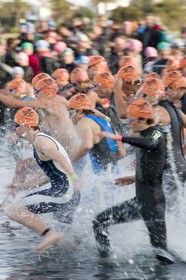 Harris says about triathlons: "It’s something someone just signs up to do. They might prepare for a triathlon by swimming laps in their pool. That’s a lot different than swimming in a lake or a river." Honestly, I don’t know of one triathlete who signed up for a triathlon on a whim, swam a few laps in a pool, and then charged out into a lake or ocean to compete in an Olympic-distance triathlon.
Harris says about triathlons: "It’s something someone just signs up to do. They might prepare for a triathlon by swimming laps in their pool. That’s a lot different than swimming in a lake or a river." Honestly, I don’t know of one triathlete who signed up for a triathlon on a whim, swam a few laps in a pool, and then charged out into a lake or ocean to compete in an Olympic-distance triathlon.
Dr. Lori Mosca writes, "It’s quite frightening — there are hundreds of people thrashing around. You have to keep going or you’re going to drown." While it is true that the swim portion of a triathlon can be chaotic and demanding, there are measures a swimmer can take to rest, and sanctioned races have officials on canoes in the water to provide help if needed.
Every Sport Involves Risk
I don’t mean to make light of the risk associated with the sport of triathlon, and especially the swimming portion. Every sport has risk involved.
According to Consumer Reports (March 1997), the Consumer Product Safety Commission shows that recreational sports are linked to accidents that most often require emergency-room treatment, accounting for one-third of the emergency-room visits each year. Fishing accounts for 80,000 emergency room visits, and soccer results in 150,000 emergency room visits. The most dangerous sport, according to the Commission, is basketball, with more than 600,000 reported emergency room visits. Other sports listed among the most dangerous include football, skiing and snowboarding, all-terrain vehicle racing, and hockey.
Dr. Harris’ triathlon study states that of the 14 deaths identified, 13 occurred during swimming; the other was a bike crash. Autopsies on 6 of the victims showed that 4 had underlying heart problems. Two others had normal-looking hearts, but they may have suffered a fatal heart rhythm problem, Harris said. According to the British Journal of Sports Medicine, "In patients with pre-existing coronary heart disease, left ventricular hypertrophy seems to be a risk factor for exercise-related sudden death."
Some Precautions For Triathletes
Based on the study, a few critical items seem important to stress:
- Get checked out.
Don’t blow off the wisdom of, "Seeing your doctor BEFORE beginning rigorous exercise." The sport of triathlon is an endurance sport that puts unusually high demands on your body. Any preexisting health or medical condition (especially any heart-related condition) could significantly increase your risk. Your condition doesn’t necessarily mean you can’t be a triathlete, but it may influence how you train and the certain precautions and adjustments you need to make.
- Know your own swimming abilities.
The swimming portion of a triathlon will not necessarily be canceled because of high wind and rain. Occasionally, the swim course can be altered to better adjust to weather conditions, but not always. At times, participants may be given the option of doing a duathlon if the swim course is deemed to have an unusually high degree of difficulty because of weather conditions.
- Decide for yourself.
Don’t expect the decision to be made for you in terms of whether you should or shouldn’t swim in difficult waters at a triathlon event. You must decide for yourself if you are capable of swimming in high wind, white cap type open water conditions.
- Think twice about difficult swim events.
Generally, if you are a beginner and an inexperienced swimmer, seriously consider opting out of an event where the swim involves such difficulty. There are exceptions. Say, if it’s your first triathlon but you are a Navy Seal, the water conditions are likely not to bother you. Otherwise, an inexperienced swimmer should simply exercise caution.
- Make swimming your strength.
For many triathletes, swimming is their "weakest" event. Why not decide to make it your strength?
How To Make Swimming Your Strength
Here are a few suggestions:
#1 Perfect your technique.
Effective swimming is mostly about technique. Get professional input and feedback on your swim stroke. Total Immersion has a wealth of resources to help you become a better swimmer.
#2 Master open-water swimming.
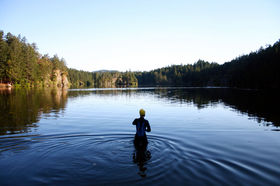 Many triathletes dislike open-water swimming. Do a lot of their training in a pool, and only tolerate open-water swimming when it’s necessary or at a minimal level. Learn to love and prefer open-water swimming. Find a training partner or two, and decide that you are going to tackle open-water swimming and learn to love it.
Many triathletes dislike open-water swimming. Do a lot of their training in a pool, and only tolerate open-water swimming when it’s necessary or at a minimal level. Learn to love and prefer open-water swimming. Find a training partner or two, and decide that you are going to tackle open-water swimming and learn to love it.
#3 Learn multiple strokes and rest measures.
The more stokes you know and the more rest and relaxation techniques you know, the better equipped you will be to deal with any potential problems in the water.
#4 Learn to swim in choppy water.
Basically, when swimming in high waves the trick is to avoid doing what your brain tells you that you should do.
It seems like the thing to do is to pull your head straight up and out of the water in order to avoid swallowing water, and to be able to grab a breath and climb over waves. The problem is, once you raise your head and shoulders up, your legs go down and you begin exerting twice the energy to go forward.
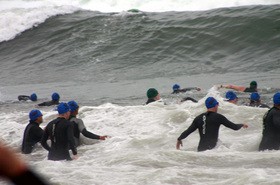 Chances are, you will still get hit by an incoming wave anyway because you may not be able to get high enough over the wave as it breaks. When you raise your head and shoulders up straight out of the water, the waves will actually push you back and you will be making no forward progress. As a result, you’ve got double trouble — you’re expending too much energy and not moving forward and you are going to get fatigued and you might panic because your attempts are failing and you are still swallowing water.
Chances are, you will still get hit by an incoming wave anyway because you may not be able to get high enough over the wave as it breaks. When you raise your head and shoulders up straight out of the water, the waves will actually push you back and you will be making no forward progress. As a result, you’ve got double trouble — you’re expending too much energy and not moving forward and you are going to get fatigued and you might panic because your attempts are failing and you are still swallowing water.
So, instead it’s better to ride atop the waves rather than fight them. Keep taking your side breaths as is typical of the freestyle stroke. There should always still be that pocket of air for you to take your breaths.
The modification you need to make will possibly be rolling a little bit further to your side in order to make sure you get that breath — or exerting a slight bit more energy to raise yourself up a tad when it’s time for you to turn for your breath.
Riding the rolling waves can be a strange sensation, and it may feel like you are not moving forward, but you are. You will still need to sight your buoys (probably more often than normal) in order to stay on course.
Find a group of triathlon friends who are willing to gather together on a choppy water day and practice open-water swimming in those conditions. Have one or two experienced people on a canoe following you around in the water as an added safety measure. I know it seems like a lot of work, but it will pay off when you have to contend with such conditions in a real race.
Let me know your opinion and what you think about the study. You can read the article in full here.

